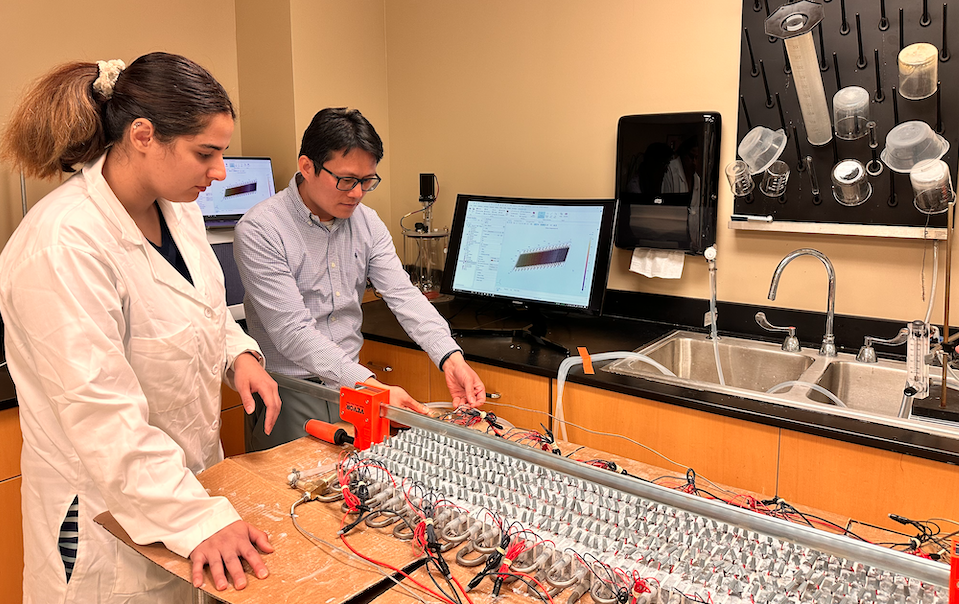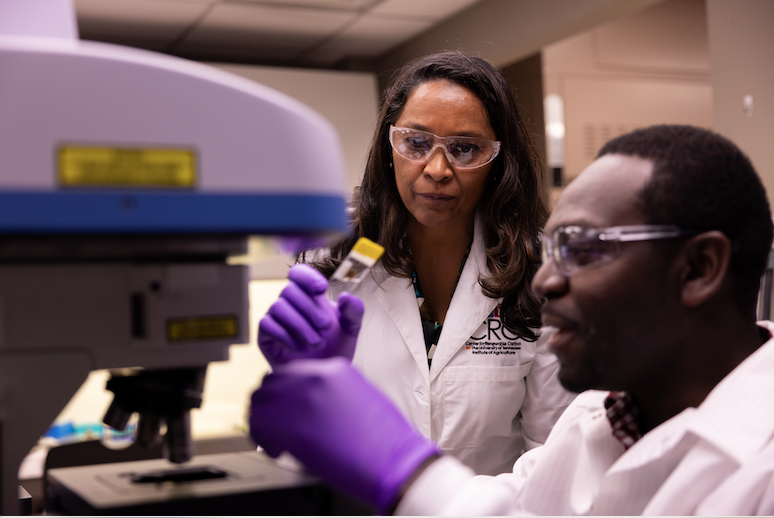
In the pursuit of a thriving and sustainable future for Tennessee, UTIA is committed to enhancing and protecting our natural resources and fostering a sustainable environment. Our approach reflects a balance between human prosperity and environmental well-being.
Empowering Tomorrow
Advancing US energy interests with breakthrough technologies
What do converting biomass into liquid fuels and using artificially intelligent solid-state microwave technology have in common? Both have the potential to significantly improve the long-term sustainability of our nation’s energy resources.
American-grown bioenergy crops can produce fuels for a wide range of vehicles, from tractors to jets. The idea is to reduce reliance on petroleum-based energy by replacing oil and its chemical byproducts—such as methane, propane, and butane—with biobased fuels and products. These alternatives are low-carbon and environmentally friendly.
Associate professor of biosystems engineering Nour Abdoulmoumine is deeply interested in this topic. His studies focus on using thermochemical conversion technologies, such as gasification and pyrolysis, with the ultimate goal of producing refinery-ready intermediates or advanced fuels from agricultural products that are readily available in the Southeast and other regions.
Says Abdoulmoumine, “Drawing on the successful model of the petrochemical industry, it is evident that the success of future biorefineries will require coupling biofuel and bioenergy production with co-production of a diverse portfolio of high-value chemicals and biomaterials.” His goal is to use existing petrochemical infrastructure also to support biobased fuels and their co-products.
Jiajia Chen is approaching energy research from a different angle. As an associate professor of food engineering, he specializes in microwave and radiofrequency processing for industry and commercial kitchens. Chen’s work with solid-state microwave technology uses artificial intelligence to guide heating, which could reduce the nation’s energy needs and boost productivity in the food processing industry. He focuses on improving heating efficiency and uniformity. This technology could be used in commercial kitchens and other industrial applications to convert biowaste into beneficial biochar, which has multiple uses.
In addition to his work with microwaves, Chen is developing thermoelectric-based technology to electrify and decarbonize liquid food pasteurization. This project, funded by the National Dairy Council, aims to improve energy efficiency in industrial-scale and on-farm milk pasteurization.
Both researchers have recently submitted successful proposals to the US Department of Energy.
A New Model for Sustainability
The model for circular bioeconomy systems is industrial recycling. Renewable resources, like agricultural crops and wood residues, are the main inputs used to manufacture energy and products, and waste streams are repurposed into inputs for new processes.
This closed-loop system reduces reliance on limited resources and minimizes environmental impact. Social impacts are considered, too, as a skilled workforce is integral to success.
The UT Center for Renewable Carbon is spearheading circular bioeconomy initiatives in biobased chemicals, polymers, fuels, and composite systems. Aviation, automobile, and packaging industries are among the target industries for this work.
“The Circular Bioeconomy Systems model drives innovation and can revitalize rural economies with new opportunities for growth. At the Center for Renewable Carbon, we are committed to pioneering this model to ensure a greener and more prosperous future,” says center director and Charles E. Wharton Institute Professor Niki Labbé.
In 2024, Labbé was appointed co-leader of the UT Convergent Research Initiative focused on circular bioeconomy research, alongside Erin Webb, laboratory relationship manager and DOE Bioenergy Technologies Office group leader for Oak Ridge National Laboratory’s Bioresource Sciences Division. The initiative envisions producing materials from sustainable carbon sources, pioneering the shift toward circular agriculture and manufacturing.

In a related effort, in September 2025, UT AgResearch will host a conference where representatives from government, academia, and industries will discuss ways to advance the industrial model across the Southeast. One theme is extending the lifetime and value of sustainably produced carbon in the marketplace. Organizers include Associate Dean Tim Rials and Labbé. “This conference represents a pivotal step towards integrating innovative bioderived materials into our economy,” says Rials.
Labbé also serves as the UT lead for an effort to win a $160 million National Science Foundation award. Led by Alabama-based HudsonAlpha Institute for Biotechnology, the economic engine proposal, named BRIDGES (Biobased Rural Innovation for Domestic Growth and Economic Security), aims to transform rural Alabama and Tennessee by creating strong, localized supply chains between farmers and rural manufacturing facilities.
“The BRIDGES engine will create synergistic partnerships linking biomass producers directly with manufacturers and consumers, building a strong, circular bioeconomy that will boost rural economic growth in the Southeast and beyond,” says HudsonAlpha’s Jeremy Schmutz, co-principal investigator for the BRIDGES project.
By diversifying income sources for rural communities and fostering long-term stability and growth, the program promises to strengthen America’s competitiveness.
Explore More on
FeaturesStrategic Plan Priorities
MORE FROM THIS ISSUE

















